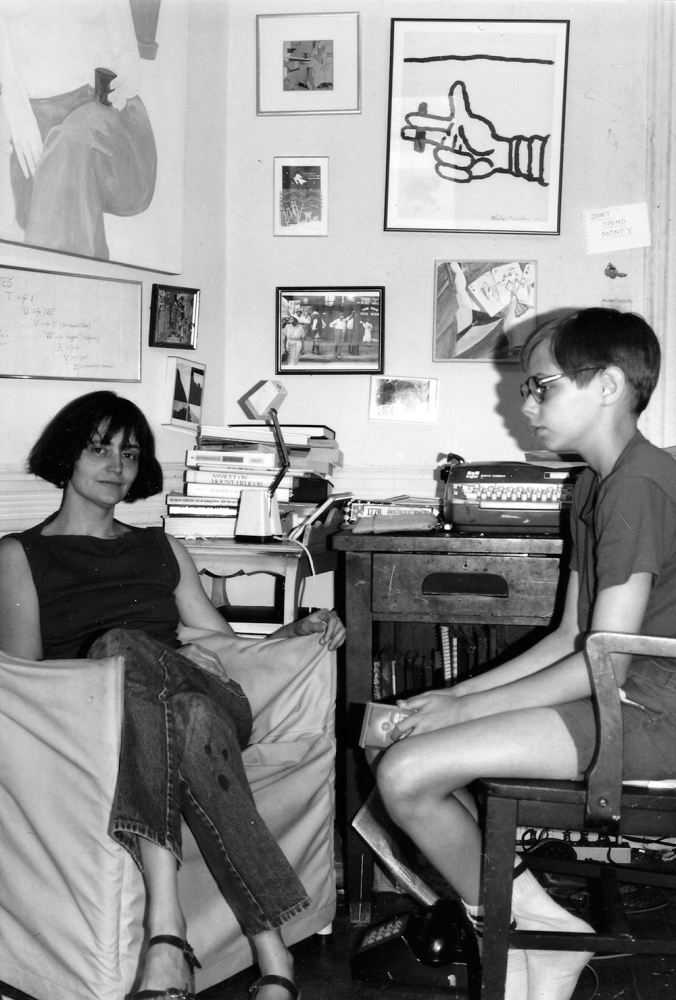
ALICE NOTLEY AT HOME WITH HER SON ANSELM, NEW YORK, 1984. PHOTOGRAPH BY SUSAN CATALDO, COURTESY OF ALICE NOTLEY.
I was not raised with any religion. We weren’t told that God was dead; having never existed, he’d had no opportunity to die. Instead, the material world had its own beauty, if occasionally cold or mathematical: the paradox of particle and wave, the litanies of astounding facts and figures (do you know how a snake sheds its skin?). It was a view of life ruled by information: sensible, finite, hard.
And so, when poets find the confidence to prophesy, I often doubt. If someone tells me in so many words that they are about to deliver me another Book of Luminous Things, as Miłosz memorably titled one anthology, my brow furrows, even if I remain curious. When I was in college, I was in a workshop with a poet who was writing their dissertation on “vatic” poetry of the twentieth century. After looking up the word, I always found it slightly amusing. How easily the mystic could be isolated, another device in the poet’s bag of tricks. Poets are used to the idea of other voices speaking through them (don’t get them started on the etymology of inspire), but an overreliance on a private line to a higher power can begin to feel cheap. There’s a reason Berryman called Rilke a jerk (though of course, pot, kettle).
But when I first read Alice Notley’s sprawling, twisting, hilarious, and deadly serious poem “The Prophet,” I regained a certain measure of belief. The poem, written in the late seventies, stretches across a dozen pages in long lines alternating with short, a little like Whitman’s exultations spilling over the margin. Who’s speaking? Hard to say—you feel the voice, but lines ricochet in different directions. Take the first two: “They say there is a dying star which is traveling in two directions. / Don’t brood over how you may have behaved last night.” Nearly opposite ideas—one cosmic, one personal—but somehow fusing. Then language rains down like brimstone. It seems to never stop, never waiting for you to “place” it—it’s the difference between a prophet in a white beard and white robes and another speaker who is at once more ordinary, more elusive, and more terrifying. Commands (“You must often luminously tell / The grossest joke you know to all those stiffs in the other room”), suggestions (“Perhaps you should / Call money ‘green zinnias’ ”), declarations (“Science has almost made it that you yourself hardly ever perceive / anything”), questions (“Why must your / Husband occasionally seem to think other women are more wonderful / than you?”), and observations (“When you / do the mistaking, / The taco-&-vodka man laughs wickedly”) intertwine and contradict, throwing up scenes and ideas and dismantling them just as fast. The poem is studded with New York scenes and TV-show flickers, but it’s also a mind voyaging through and beyond the quotidian, held together with confidence from a place you can’t observe.
And isn’t the prophetic something truly surprising, arriving from outside our impaired vision? Could we all have the ability to surprise if we were willing to loosen certain ideas about poetry that we think we require? Notley writes, “Don’t be afraid of your own mind, there’s an ocean there you know / how to swim in.” Surrendering to that potentially infinite flow brings inner and outer together, makes our ordinary coeval with that dying star. Luminous without the eye roll. “The Prophet” helps you to exist for a while in a place between meaning and not meaning—somewhere easy to get to, but maybe not so easy to stay in. It’s tempting to compare it to the oracle at Delphi, writhing through the fumes—I suppose she had a good time, too, and maybe a sense of humor in delivering all those reversible curses. As Notley’s poem says, either breaking down or going too fast for any consciousness (hard to tell): “You have remarkable power / Which you not using like sonofabitch.”
David Schurman Wallace is a writer living in New York.
from The Paris Review https://ift.tt/ROV5zEj
Comments
Post a Comment